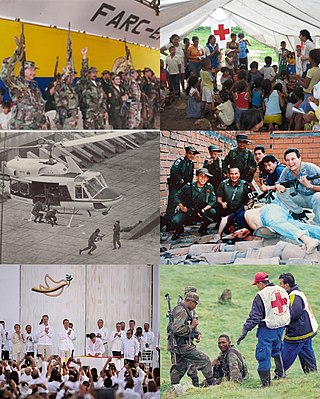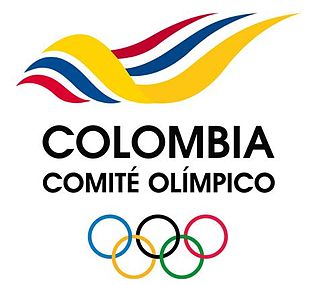Medal summary
Men's events
Women's events
Mixed events
| Event | Gold | Silver | Bronze |
|---|---|---|---|
| Doubles | Samantha Terán Jose Becerril | Nicolette Fernandes Maxim Weithers | Maria Restrepo Javier Castilla |
Karen Meakins Gavin Cumberbatch |
| Squash at the 2006 Central American and Caribbean Games | |
|---|---|
| Location | Cartagena |
| Dates | 15–30 July |
The Squash competition at the 2006 Central American and Caribbean Games was held in Cartagena, Colombia. The tournament was scheduled to be held from 15 to 30 July 2006.
| Event | Gold | Silver | Bronze |
|---|---|---|---|
| Doubles | Samantha Terán Jose Becerril | Nicolette Fernandes Maxim Weithers | Maria Restrepo Javier Castilla |
Karen Meakins Gavin Cumberbatch |
* Host nation (Colombia)
| Rank | Nation | Gold | Silver | Bronze | Total |
|---|---|---|---|---|---|
| 1 | 6 | 1 | 1 | 8 | |
| 2 | 1 | 1 | 0 | 2 | |
| 3 | 0 | 3 | 5 | 8 | |
| 4 | 0 | 1 | 1 | 2 | |
| 5 | 0 | 1 | 0 | 1 | |
| 6 | 0 | 0 | 3 | 3 | |
| 7 | 0 | 0 | 1 | 1 | |
| 0 | 0 | 1 | 1 | ||
| Totals (8 entries) | 7 | 7 | 12 | 26 | |

Colombia, officially the Republic of Colombia, is a country in South America with insular regions in North America—near Nicaragua's Caribbean coast—as well as in the Pacific Ocean. The Colombian mainland is bordered by the Caribbean Sea to the north, Venezuela to the east and northeast, Brazil to the southeast, Ecuador and Peru to the south and southwest, the Pacific Ocean to the west, and Panama to the northwest. Colombia is divided into 32 departments. The Capital District of Bogotá is also the country's largest city. It covers an area of 1,141,748 square kilometers, and has a population of around 52 million. Colombia's cultural heritage—including language, religion, cuisine, and art—reflects its history as a Spanish colony, fusing cultural elements brought by immigration from Europe and the Middle East, with those brought by enslaved Africans, as well as with those of the various Indigenous civilizations that predate colonization. Spanish is the official state language, although English and 64 other languages are recognized regional languages.

The Revolutionary Armed Forces of Colombia – People's Army is a Marxist–Leninist guerrilla group involved in the continuing Colombian conflict starting in 1964. The FARC-EP was officially founded in 1966 from peasant self-defense groups formed from 1948 during the "Violencia" as a peasant force promoting a political line of agrarianism and anti-imperialism. They are known to employ a variety of military tactics, in addition to more unconventional methods, including terrorism.

Pablo Emilio Escobar Gaviria was a Colombian drug lord and narcoterrorist who was the founder and sole leader of the Medellín Cartel. Dubbed "the king of cocaine", Escobar was the wealthiest criminal in history, having amassed an estimated net worth of US$30 billion by the time of his death—equivalent to $70 billion as of 2022—while his drug cartel monopolized the cocaine trade into the United States in the 1980s and early 1990s.

Álvaro Uribe Vélez is a Colombian politician who served as the 31st President of Colombia from 7 August 2002 to 7 August 2010.

The Colombian Liberal Party is a centre to centre-left political party in Colombia. It was founded as a classical liberal party but later developed a more social-democratic tradition, joining the Socialist International in 1999.

The Colombia national football team represents Colombia in men's international football and is managed by the Colombian Football Federation, the governing body for football in Colombia. They are a member of CONMEBOL and are currently ranked 17th in the FIFA World Rankings. The team are nicknamed Los Cafeteros due to the coffee production in their country. Notably, the national team has been a symbol of nationalism, pride, and passion for many Colombians worldwide. Colombia is known for having a passionate fan base, and the team's dances during goal celebrations have been symbolic.

Fabiola Zuluaga is a retired tennis player from Colombia. She reached the Australian Open semifinals in 2004 and became the first Colombian tennis player to reach a Grand Slam semifinal. Zuluaga is one of the most successful tennis players that Colombia has had.

The Alternative Democratic Pole is a left-wing political party in Colombia.

The Colombian conflict began on May 27, 1964, and is a low-intensity asymmetric war between the government of Colombia, far-right paramilitary groups, crime syndicates, and far-left guerrilla groups such as the Revolutionary Armed Forces of Colombia (FARC), the National Liberation Army (ELN) and the Popular Liberation Army (EPL), fighting each other to increase their influence in Colombian territory. Some of the most important international contributors to the Colombian conflict include multinational corporations, the United States, Cuba, and the drug trafficking industry.

Estadio Metropolitano Roberto Meléndez, commonly known as Estadio Metropolitano, or colloquially, El Metro, is a multi-use all-seater football stadium in Barranquilla, Colombia. It is the home stadium of local football team Atlético Junior. It was built with a capacity of 46,692 for the Colombian World Cup bid in 1986. The stadium was inaugurated that year with a game between Uruguay and Junior, which the Uruguayans won 2–1. It is the largest stadium in Colombia, after the Estadio Deportivo Cali's renovation. The first official name of the stadium was Estadio Metropolitano, which was changed around 1991 in order to honor the Colombian footballer Roberto Meléndez. This is the official stadium for the national football team of Colombia.
Parliamentary elections were held in Colombia on March 12, 2006 to elect members of the Senate and Chamber of Representatives. Presidential primaries were also held for the Liberal Party and the Alternative Democratic Pole prior to the upcoming presidential elections in May.

The IX South American Games was a multi-sport event held between 19 and 30 March 2010 in Medellín, Colombia. The Games were organized by the South American Sports Organization (ODESUR), who awarded the Games to the city with 8 votes over the bid by previous host Santiago, Chile.
Colombian Conservatism is a broad system of conservative political beliefs in Colombia that is characterized by protectionism, support for Catholic values, social stability and anti-totalitarianism. Its history began with the creation of two conservative political parties in Colombia. One characteristics of Colombian Conservatism, in contrast to many other geographic subsets of conservatism, is its strong emphasis in protectionism, which is considered by many Colombian conservatives to be necessary to create a fair market.
Following are the official winners of the national Colombian Chess Championships from 1928 to date. The first Colombian Men's Championship was held in Cali in 1928, and first Women's Championship in Bogotá in 1965.

This article concerns the process for determining the host nation of the 2014 FIFA World Cup, which concluded on 30 October 2007 with the confirmation of Brazil as the hosts.
This page shows the results of the cycling competition at the 2006 Central American and Caribbean Games, held on July 21 and July 22, 2006, in Cartagena, Colombia.
The 2nd South American Under-23 Championships in Athletics were held in Buenos Aires, Argentina, at the Centro Nacional de Alto Rendimiento Deportivo (CeNARD) on November 10–12, 2006. The championships were held as a part of the 2006 South American Games (ODESUR). A detailed report on the results was given.
The Judo competition at the 2006 Central American and Caribbean Games was held in Cartagena, Colombia. The tournament was scheduled to be held from 25 to 29 July at the Coliseo de Gimnasia y Deportes de Combate, Unidad Deportiva Pedro de Heredia in Cartagena. This was the first time that the regional games held the Kata division.
Video gaming is a growing sector in Colombia. The medium has been popular in the country since the 1980s, but little local development had taken place until the turn of the 21st century. As the country has been producing many engineers since the early 2010s, many of which specialized in electronics, industry and information technology, the local video game industry has been booming.

The Colombia national under-23 football team represents Colombia at the Summer Olympic Games and in international under-23 football competitions and is overseen by the Colombian Football Federation.